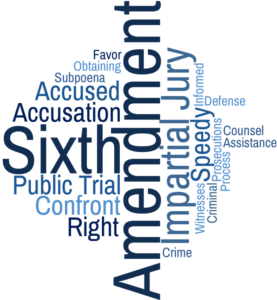29 Oct ABKLaw BLOG: The Pro Se Defendant
BLOG from our #ABKLaw Partner Michael Jaccarino, Esq.: The Pro Se Defendant
Many infamous criminals have represented themselves while on trial. Some examples are Colin Ferguson, John Allen Muhammed, Dr. Jack Kevorkian, Zacarias Moussaoui, and even Ted Bundy. They all have one thing in common…. they all embarked on a reckless path of self-destruction, confirming the popular quip among lawyers that “one who is his own lawyer has a fool for a client.”
Recent experiences have highlighted for the lawyers in our firm that the ramifications of self-representation supports a substantial need for greater restriction on the right and standardization of the procedure to provide guidance for courts and to eradicate inconsistent treatment of pro se defendants.
In New York, the Court of Appeals held in People v McIntyre that the “right to self-representation embodies one of the most cherished ideals of our culture; the right of an individual to determine his own destiny.” While true, the destiny for the self-represented individual almost universally ends the same – with the defendant putting forth an awkward or outlandish defense and conducting the trial with no knowledge of procedure or the rules of evidence and, finally, being found guilty.
The New York standard follows the United States Supreme Court, which held that the right to counsel embedded in the 6th Amendment also contains the right to waive counsel. However, an application to defend oneself, or go pro se, must be made unequivocally, timely, clearly, knowingly, voluntarily, and unconditionally. In other words, the defendant must realize what he is doing and that he will be at a huge disadvantage. Likewise, should a judge grant the application, they will usually appoint standby counsel, whose only role is to assist the defendant upon his or her request. Standby counsel, while not permitted to have a speaking role before the jury, can serve as a worthy tool for a pro se defendant, who not only lack access to many legal materials, but are unfamiliar with the rules of the courtroom or how to ask questions and make arguments.
Currently, the standard to determine whether a defendant who is found competent to stand trial is the same as whether to grant the defendant’s application to proceed pro se. Many are beginning to wonder if that should change, raising the bar to when a defendant is allowed to represent himself. In particular, many defendants are competent enough to understand the legal charges that they are facing, but still suffer from severe mental illness to the point where they are not competent to conduct trial proceedings by themselves. Currently, this analysis is not undertaken by judges in New York State. Should a mentally ill defendant voluntarily and knowingly waive a lawyer, the judge must allow them to represent themselves. Often times, this not only does a disservice to the defendant, but does not protect societal interests or maintain judicial efficiency. In 1975, the Court of Appeals rejected the contention that there are two separate and distinct levels of mental capacity. It may be time to rethink that decision.
Many defendants choose to proceed pro se for various reasons, including a disrespect for authority, hostility towards the criminal justice system, or an attempt to manipulate or exhibit their rebelliousness. However, it is illogical to believe that a defendant facing criminal charges, with no legal background, can effectively construct and articulate a defense, a skill that takes a competent lawyer years of schooling and practical experience to master. The 6th Amendment is intended to provide protection to defendants in the criminal justice system. Allowing many of them to proceed pro se does the opposite.
Source – Touro Law Review

#NewYorkLaw #NYLawFirm #CriminalDefense #CivilLitigation
#NYLawFirm #NYAttorney #ABKLaw #TrialAttorney #Appellate #AttorneyDisciplinary #RealEstate #PersonalInjury



